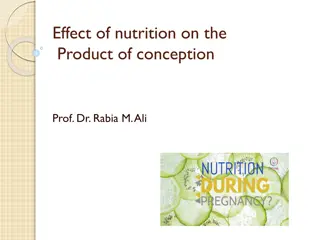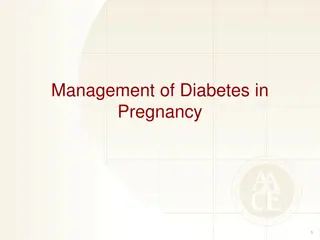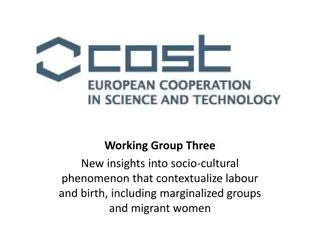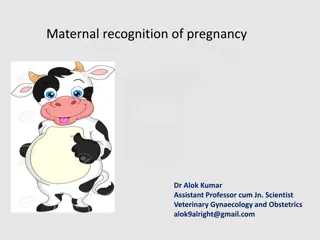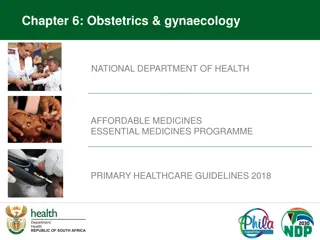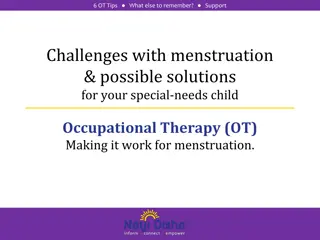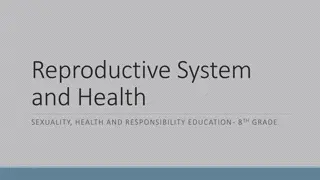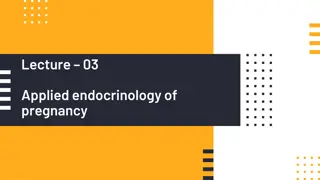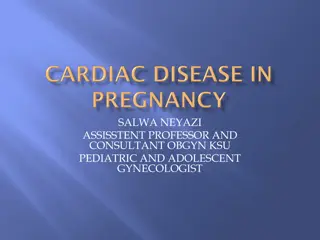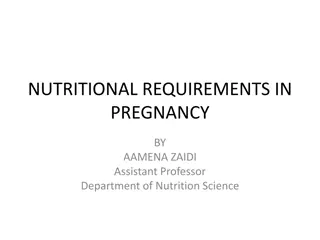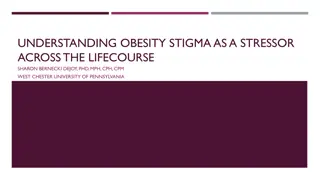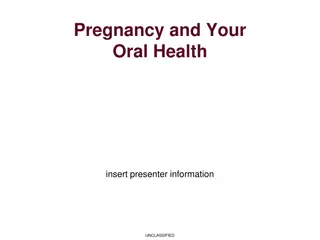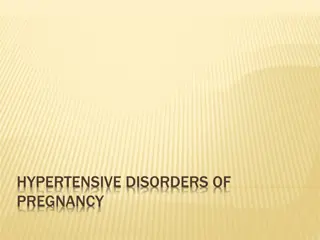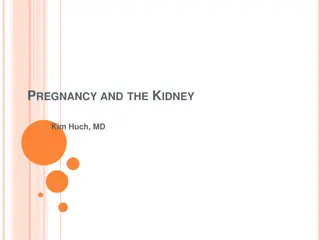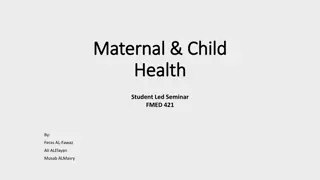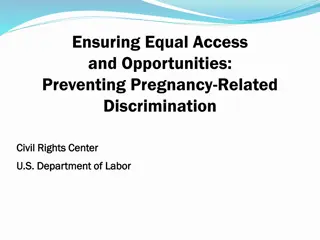Understanding Menstruation, Pregnancy, and Childbirth Lesson 14
This lesson covers various aspects related to menstruation, conception, and the female sexual cycle. It explains what menstruation is, common facts about periods, the female sexual cycle, and details about the menstrual cycle phases. Information on hormones controlling menstruation, ovulation, fertilization, and what happens if an egg is not fertilized is also provided. The content includes engaging activities and visuals to enhance learning about these essential topics related to women's reproductive health.
Download Presentation

Please find below an Image/Link to download the presentation.
The content on the website is provided AS IS for your information and personal use only. It may not be sold, licensed, or shared on other websites without obtaining consent from the author. Download presentation by click this link. If you encounter any issues during the download, it is possible that the publisher has removed the file from their server.
E N D
Presentation Transcript
MENSTRUATION, PREGNANCY & CHILDBIRTH LESSON 14
DO NOW: What type of family would you like to have? Would you like to be: Single? Partnered? Married? In a committed relationship? Would you like to have children or not? If yes, how many? At what age?
MENSTRUATION & CONCEPTION All About Periods
What is Menstruation? The shedding of the uterine lining through the vagina, commonly called a period Periods may be irregular for 12-18 months after menarche (first period)
Facts about Menstruation Typical blood loss is 1 6 tablespoons People can use pads, tampons, or menstrual cups to catch the blood About 50% of females have cramps. There are many ways to relieve cramps, including staying hydrated, stretching, using a heating pad, doing minor exercise, and taking pain medication.
What is the Female Sexual Cycle? Menstrual Cycle = how the ovaries and other sexual organs prepares itself each month to accommodate a growing pregnancy if it were to occur The time between when periods start Normal for a menstrual cycle to be between 21-35 days long Controlled by the hormones estrogen and progesterone
Menstruation Follicle Develops Last Two Weeks = egg (Shown much larger than actual size) Ovulation
Menstrual Cycle 1.What hormones control menstruation? Estrogen - Increases at beginning of cycle & controls ovulation Progesterone - Increases around ovulation, helps to maintain pregnancy 2. When does ovulation happen? Usually 2 weeks before bleeding begins, around the middle of the cycle. 3. When can fertilization happen? The egg is available to be fertilized in the fallopian tube for 24 hours after ovulation. Sperm can live & fertilize an egg for up to 5 days after ejaculation. 4. What happens if an egg is not fertilized? The egg disintegrates. (breaks down) Estrogen and progesterone levels drop. The lining of the uterus (endometrium) sheds during menstruation.
Keeping Track of Periods CHART FREE PHONE APPS iPeriod (Apple) Happy Period (Android) www.patient.co.uk/diagra m/Menstrual-Diary.htm Period questions answered - ubykotex.com
FERTILIZATION Fertilization occurs in the fallopian tube (2 weeks before period would begin) Over half of all fertilized eggs don t become a pregnancy If it lives, within 12 hours the egg begins to divide & travels down the fallopian tube toward the uterus
IMPLANTATION When Pregnancy Begins Egg reaches uterus after 4- 5 days & plants itself in the endometrium. This is called implantation. Implantation is what most health care providers consider the beginning of pregnancy (conception)
Pregnancy Options Carry pregnancy to term & become a parent Carry pregnancy to term & make an adoption plan Abortion Minors can have an abortion without parent/guardian permission In CA, legal up to 24 weeks & after 24 weeks to save life or health of mother o o
CA Safe Surrender Baby Law Parent can legally surrender a baby within 72 hours of birth Baby must be dropped off at a Safe Surrender Site: Hospital Fire department Police station
Pregnancy Symptoms What are some physical signs of pregnancy? Missing a period Tender, swollen breasts Fatigue / tiredness Nausea with or without vomiting Frequent urination
STAGES OF PREGNANCY Weeks of development EMBRYO first 2 months FETUS from month 3 through birth BABY medically, only after birth
STAGES OF PREGNANCY Pregnancy is divided into three 3-month periods called trimesters 1st Trimester 2nd Trimester 3rd Trimester
First Trimester (months 1-3) Many people don t know they are pregnant during 1st trimester Embryo/fetus needs enough folic acid (Vitamin B-9) for brain development Tobacco, alcohol, drugs, infections- including STIs, and unhealthy life choices are harmful embryo/fetus MEDICATION ABORTION (pill) available through week 9 at most health centers
First Trimester (months 1-3) Embryo from 5-11 weeks Major organs Neural tube Beginnings of eyes, ears, lips Weeks of development Fetus at 12 weeks Umbilical cord connects fetus to placenta By end of 3rd month 2-3 inches long Beginnings of sex organs Begins to move
Second Trimester (months 4-6) Weeks of development Organs continue to mature By end of 2nd Trimester: 14 inches long Cannot survive outside the uterus without a lot of special medical attention Abortion is legal in CA up until 24 weeks for any reason & after 24 weeks to save life or health of the mother
Third Trimester (months 7-9) Brain & lungs mature Eyes open and close Sucks on thumb Responds to light Due date: 40 weeks from the first day of the last menstrual period Average birth weight: 7.6 pounds Average birth length: 20 inches Weeks of development
Stages of Childbirth Early Labor: Contractions begin & cervix dilates to 3cm. Stage 1 Active Labor: Contractions become stronger, longer, and closer together. Cervix becomes fully dilated to 10cm. Stage 2 Delivering the baby Stage 3 Delivering the placenta
Childbirth Options Type of birth: vaginal or cesarean birth Setting: hospital, birthing center, home birth, water birth Support: physician/doctor, midwife, doulas, friends, family, partner(s) Comfort measures: medicines, positions, massage, acupressure, etc.
WHAT IMPACTS HEALTH? What actions do people do to be healthy? What are some of things that can have a negative impact on health? Which of these things can interfere with a healthy pregnancy?
Prenatal Care (Health care during pregnancy) Special check-ups to maintain health of biological mother & fetus Role of health care provider Medical services Help to maintain healthy life choices while pregnant Treat potential health problems early Provide info & answer questions In California, available free or low-cost, including for people who are undocumented.
Preconception Health (Health before pregnancy for all people) Healthy Life Choices Multivitamin with folic acid Nutritious meals & exercise Avoid drugs, alcohol & smoking Manage stress Healthy relationships Avoid toxins / dangerous chemicals
Preconception Health (Health before pregnancy for all people) Before pregnancy, see health care provider Test for STIs (Family PACT covers these costs) Vaccinations up-to-date Get medical conditions (diabetes, high blood pressure) under control Check to see if medications could harm pregnancy Consider getting tested for genetic conditions
What are the benefits of preconception health for someone who is not actively planning a pregnancy? Better health right now Forming healthy habits Prepared for pregnancy (50% of pregnancies unplanned)
Why would it be healthy to avoid toxic substances and dangerous chemicals in the home or work environment? A growing fetus is even more likely to be hurt by toxins than a teenager or fully grown adult.
Why would it be healthy to create and establish healthy, supportive relationships? Stress can have a negative effect on sperm production, a female s ability to become pregnant, and a growing fetus. On the other hand, a positive relationship can support the health of a pregnant female and a fetus.
We serve you what's hot in pop culture with a healthy dose of honesty! www.todayis4tomorrow.tumblr.com Text TODAY to 61827 for resources, a clinic locator, & weekly tips on: Healthy living Safer sex Job seeking Mental health More



